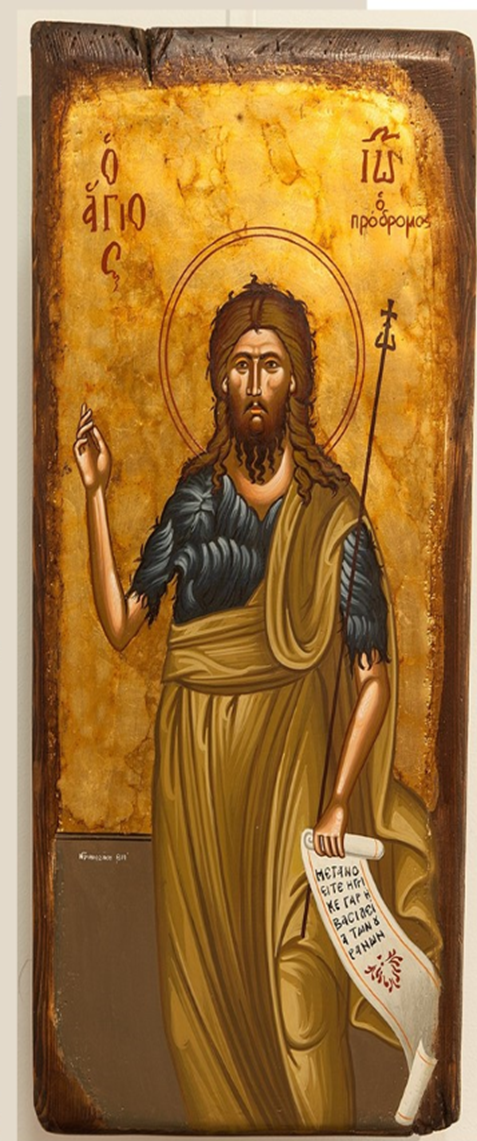NATIVITY OF THE FORERUNNER AND BAPTIST

The Nativity of JOHN THE FORERUNNER prepares the human race to meet the Son of God on earth. The Holy Prophet Zachariah and the Righteous Elizabeth were the parents of the Holy Prophet, Forerunner and Baptist of the Lord, John (LK. 1:5-13). His name is a variation of the Hebrew "Johanan," which means "Yah is gracious." John was the last of the Old Testament prophets, thus serving as a bridge figure between that period of revelation and Jesus. St. John is known as the Forerunner because he preceded Christ and taught repentance, which prepared men for Jesus' teaching and His ministry (... For you will go on BEFORE THE LORD TO PREPARE HIS WAYS... [LK. 1:76-79]). He even recognized Christ as the Messiah as early as when they were both still in their mothers' wombs: the Virgin Mary went to visit her cousin Elizabeth and when they embraced John leapt in his mother's womb (LK. 1:41), which is considered his first acknowledgment of Christ as Messiah. St. John lived as an ascetic from the earliest part of his life. He ate plants and roots and wore rough clothing. When he grew, he baptized people in the Jordan, teaching repentance, but also saying that someone greater would come after him and baptize with the Holy Spirit (LK. 3:16; MK. 1:8; Mat. 3:11; Jn. 1:33). John the Forerunner was born at the time of the year (June 24) when the day begins to grow shorter after the summer solstice, whereas the Nativity of Christ occurs (December 25) when the day begins to grow longer after the winter solstice: "He must increase, but I must decrease" (Jn. 3:30).
BAPTISTE ET PRÉCURSEUR
Le glorieux prophète et précurseur Jean le Baptiste, aussi appelé Jean le Précurseur, car il était le précurseur du Christ, le prophète qui a annoncé Sa venue, l'a baptisé sur les bords du Jordain, après l'avoir désigné comme «l'agneau de Dieu». C'est l'un des saints les plus vénérés de l'Église orthodoxe. Jean est le cousin du Christ, par sa mère Élisabeth, qui était la fille de Zoia. Celle-ci est la sœur de la grand-mère du Christ. Il a été décapité par Hérode au premier siècle, pour satisfaire sa belle-fille Salomé et sa femme Hérodiade. Parce qu'il baptisa le Christ, il est le saint patron des parrains. L'Église, dit saint Augustin, célèbre ordinairement la vie des Saints au jour de leur mort, qui est, à proprement parler, le jour de leur naissance à la vie éternelle. La Nativité de saint Jean-Baptiste a été exemptée de cete règle générale, parce qu'il fut sanctifié avant de naître, dans le sein de sa mère, par la présence de Jésus-Christ, dans la visite que fit la Très Sainte Vierge à saint Élizabeth (Luc 1:41). La nativité de saint Jean-Baptiste fut une grande joie pour la terre, puisqu'elle lui annonçait l'approche de sa Rédemption. L'apparition du Précurseur allait montrer bientôt le Sauveur promis et attendu depuis quatre mille ans. Saint Jean-Baptiste occupe dans l'histoire de l'humanité une place incomparable: il sert de trait d'union entre les deux mondes, il résume en lui tout l'Ancien Testament et prépare le Nouveau; il ferm la mission des prophètes et ouvre celle des Apôtres.